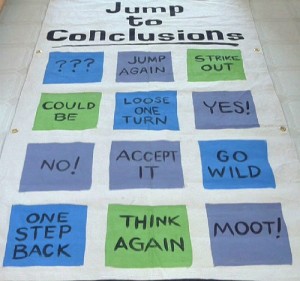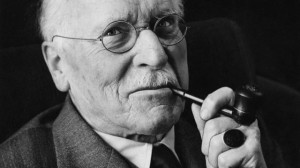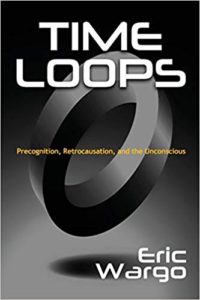Scarabs & the ‘Send’ Button: Synchronicity as Misrecognized Psi
During the weeks I was researching my previous post on 9/11 and premonitions of trauma, I had a very powerful, uncanny experience that contained, in miniature, all of that post’s themes. It began with an unusually bad day at work, where I’d felt extremely guilty over a group email I had sent to coworkers that, because of poor word choice, could have been construed as insulting to one of the people cc-ed on it. After I hit “Send,” I started to stew about it, feeling embarrassed and angry at myself for my lack of tact. This was near the end of the workday, and I felt bad about it all the way home on the metro.
Awaiting me on the doorstep was a brown paper package containing a book I’d ordered more than a week earlier and forgotten about. I order lots of used and out-of-print books on Amazon and eBay, which often take weeks to arrive, so I’ve usually forgotten them by the time I get them. This one happened to be by a former professor of mine in graduate school, on the subject of paradoxes. What stunned me was the return address on the package was a woman with the same very unusual surname as my professor, who (I assumed) could only be his wife—her Amazon Seller name was different so I’d had no idea it was her. This was obviously a remaindered copy of her husband’s long-forgotten book.
The cosmos seemed to be serving up my guilt to me on a platter. But in fact, it was just serving me an emotional time loop I didn’t immediately fathom until I delved into the matter.
This by itself would not be so amazing, but what was stunning was that I had for 25 years harbored regret over a group bulletin-board message I had sent to fellow students and faculty in my graduate department, in which, through tactlessness and poor word choice, I feared I inadvertently hurt the feelings of this woman, my professor’s wife. In other words, my current emotional situation about a work email a couple of hours earlier that day was a precise mirror image of a situation two and a half decades ago involving precisely the person who had mailed me this book on paradox.
Tactlessly hurting people in emails or bulletin board messages is not the sort of thing I do commonly—in fact, I couldn’t think of another instance in those 25 years in which quite this same thing had occurred. This book of my old professor, arriving on my doorstep, was like a bizarre short circuit between two highly unusual events a quarter century removed in time.
… Or at least, that’s how it seemed, until I took a closer look.
Temporal Bias and Beetlemania
The book on my doorstep was very much like the most famous object in the annals of meaningful coincidence, the scarab beetle that tapped on the window of Carl Jung’s Zurich office, described in his book Synchronicity:
A young woman I was treating had, at a critical moment, a dream in which she was given a golden scarab. While she was telling me this dream, I sat with my back to the closed window. Suddenly I heard a noise behind me, like a gentle tapping. I turned round and saw a flying insect knocking against the window-pane from the outside. I opened the window and caught the creature in the air as it flew in. It was the nearest analogy to a golden scarab one finds in our latitudes, a scarabaeid beetle, the common rose-chafer (Cetonia aurata), which, contrary to its usual habits had evidently felt the urge to get into a dark room at this particular moment. I must admit that nothing like it ever happened to me before or since.
We tend to think, when these things happen, that some higher organizing principle or intelligence has prearranged these coincidences in our life to act as a kind of sign. That is precisely how I felt as I opened the package from my professor’s wife. I could imagine her putting the book in the brown envelope, penning my address on the side, and muttering “Here you go, asshole” … and that this was part of a larger cosmic design to serve my own tactless or thoughtless behavior up to me on a platter. Frequently of course, synchronicities have a positive feeling, like God winking or giving us the thumbs up—or in Jung’s case, providing confirming evidence of a deeper mystery about the mind and cosmos.
But as I argued in my last post, there’s a much simpler explanation for many (albeit not all) such occurrences, so long as we grant that some kinds of information—namely, our own complex emotional reactions to future traumatic situations—can travel backward in time and influence us in the present, if only on an unconscious level.
Our own complex emotional reactions to future traumatic situations can travel backward in time and influence us in the present, if only on an unconscious level.
Much laboratory evidence has been gathered, particularly by Daryl Bem and Dean Radin, for emotional responses to imminent events. This could well explain the most common type of “synchronicity”: thinking of a certain person and then receiving a call or email from them, or thinking of an unusual object and then seeing one. We naturally interpret the present as caused by the past, because the bulk of causality seems to flow in a forward direction, and this is also how we naturally interpret the flow of our own thoughts. Thus, a causal heuristic, or temporal bias, causes us to habitually overlook natural forms of precognition and presentiment and thus misconstrue their effects as uncanny coincidences: Having a thought about our old friend X, which we naturally assume arose from our ordinary, forward train of thought, may actually have been stimulated by a presentiment or premonition of their imminent call.
J.W. Dunne noted in An Experiment with Time that this bias to interpret the present in terms of the past causes us to miss the precognitive elements in our dreams as well. Even people who assiduously record and interpret their dreams (like me, for decades, until reading Dunne’s book) rarely go back to those records in the future, in any systematic fashion, to identify possible precognitive material. Yet when you do—specifically over the next 1-2 days—a certain amount of precognitive stuff becomes quite evident. (When you take the further step of free-associative interpretation on bizarre symbols, even more “future” material turns up.)
It turned out that this principle is actually the only possible explanation for my own ‘synchronistic’ experience … and I argue it even explains Jung’s scarab much better than Jung’s own theory.
An Ass Out of You and Me
Late on the evening I received the book in the mail, I rose from bed—I was unable to sleep in my weird excitement over the coincidence—and I used my most powerful Google-fu to verify that the woman who had sent my package was indeed my old professor’s wife. Lo and behold, I discovered she was not. She was, probably, an in-law, married to another man with the same last name—a man not too far in age from my old professor, and thus likely his brother or cousin (not a son). (They had to be related, as there is no conceivable other reason why they would have possessed an unread copy of this very specific academic text other than that they had been given a copy by the author—like I said, the author’s surname is very unusual and the topic is abstruse).
In other words, my recollection of my 25-year-old blunder was triggered by a false assumption that the person who packaged up this book was the person I’d slighted all those years ago—and we all know what happens when we assume. But here’s the clincher: At work the following day, I re-read the email I had sent to my coworker, the one I had stewed over. On rereading, I realized that my words were not actually as tactless as I’d thought, and that I’d really had little cause to get as worked up as I had. The person in question harbored no ill will toward me. Why then had I emotionally overreacted?
 Indeed, my anguish over that email was one of the weirdest parts about the whole experience—I’m ordinarily a pretty calm, Zen guy, but I was in a very strange emotional state by the time I arrived home, and the name on the package made my hair stand on end from the seeming coincidence … yet there was, in fact, as my late-night googling later revealed, objectively no coincidence. I had jumped to a wrong conclusion, but it had triggered a very real emotional response.
Indeed, my anguish over that email was one of the weirdest parts about the whole experience—I’m ordinarily a pretty calm, Zen guy, but I was in a very strange emotional state by the time I arrived home, and the name on the package made my hair stand on end from the seeming coincidence … yet there was, in fact, as my late-night googling later revealed, objectively no coincidence. I had jumped to a wrong conclusion, but it had triggered a very real emotional response.
The simplest explanation for this apparent synchronicity is thus the “retrocausal” one I outlined in my last post as operating in the case of 9/11, the Titanic, Mark Twain’s dream, and the career of Elizabeth Fraser of Cocteau Twins. My awakened anguish over a reminder of my 25-year-old regret over a social blunder echoed backward a few hours to a structurally similar situation, the email at work, and caused an exaggerated emotional reaction that I naturally and logically misattributed to that email. When I got home and found the book and saw who (I mistakenly assumed) it was from, I was blown away by the coincidence: The cosmos seemed to be serving up my guilt to me on a platter. But in fact, it was just serving me an emotional time loop I didn’t immediately fathom until I delved into the matter.
In other words, there was no coincidence, no synchronicity. There was however an “acausal connecting principle” in the form of my powerful and conflicted emotional response: reawakened pain and regret coupled with a kind of excitement—a powerful emotional melange I have called, using Lacan’s term, jouissance.
Synchrosplaining and Psi-sploitation
The exact same process explains Jung’s scarab story. To see why, we need to return the scarab to its proper owner.
It is sort of natural to read the uncanny account as centering on Jung himself—it is implicitly “his” synchronicity because, well, he wrote about it, and it involves simultaneously hearing his patient’s dream story about a scarab and responding to the tapping of an actual scarab at his office window and catching it. Even though it is outside his direct control, Jung thus manages to claim and capitalize on the moment, offering the beetle to his patient (just as she had dreamed) at the precise moment she needs this gesture to break her from her rigid causal modes of thinking. Claiming this moment as a therapeutic intervention, Jung thereby presents himself as a kind of heroic modern shaman or psychomagician.
 Looking at it this way, as centered on Jung, the event truly would have to be “acausal,” as there is no way to causally explain the coincidence of hearing someone else’s story about a scarab and a real scarab happening to appear at that precise moment. But the simplest explanation is really that it’s not about Jung or his experience at all: His female patient had precognitively dreamed about the scarab, associating it with her impending therapeutic epiphany. Instead of being “Jung’s synchronicity,” a far simpler explanation is that it was his patient’s precognitive dream, and he played merely a supporting, not starring, role in it.
Looking at it this way, as centered on Jung, the event truly would have to be “acausal,” as there is no way to causally explain the coincidence of hearing someone else’s story about a scarab and a real scarab happening to appear at that precise moment. But the simplest explanation is really that it’s not about Jung or his experience at all: His female patient had precognitively dreamed about the scarab, associating it with her impending therapeutic epiphany. Instead of being “Jung’s synchronicity,” a far simpler explanation is that it was his patient’s precognitive dream, and he played merely a supporting, not starring, role in it.
Jung’s spinning of this event, which is dare I say ‘archetypal’ in the lore of the paranormal, as “synchronicity” (as opposed to merely an interesting case of ESP) reflects typical male egotism on his part—appropriating his female patient’s remarkable psi experience and turning it into something much bigger and more profound, something flattering to his (male) genius, because only he is able to grasp and explain it. Jung exploited his patient’s psi, in other words, to support his own nascent theory about how the the inner and outer worlds are linked via his pet concept of archetypes.
Jung’s overreach here may reflect a larger blindness that we all share—not only a temporal bias but also an egotistic bias: our natural habit of interpreting coincidence as the big universe harmonizing with our own little life story. The cosmos winking at us, giving us the thumbs up (or thumbs down, in my case), or at least taking an active interest in us, is a much more ego-gratifying interpretation than the notion that psi is just a natural function that operates all the time in our lives and that produces weird effects because we don’t recognize it. It would be like not believing in farts and instead concocting an elaborate theory to explain those funny smells that every so often waft through the room.
Paradoxically, it is often our ego that prevents us from including the knower in the known … although in the case of the synchronistic scarab, the knower was Jung’s patient, not Jung.
Prophetic Jouissance
There is a recursive, self-similar or self-referential quality about many meaningful coincidences and premonitory or precognitive dreams. In Jung’s case, the scarab happened to be a symbol of rebirth and awakening, so within his (or really, his patient’s) archetypal encounter was an archetype about awakening to archetypes. In my case, the book on my doorstep happened to be about insoluble paradox and contradiction as a creative force, and this fractally rhymed with the very idea that I had been writing about and that I am further developing here: the seemingly paradoxical or self-contradictory notion of time loops as an unconscious factor in thought, emotion, and dreams.
 While I think Jung’s theory—that meaningful coincidences reflect an archetypal harmonization of objective events with our unconscious minds—could be an overreach, I do think perceived coincidence does play a crucial role. Because life is a “blooming buzzing confusion” of events and information, coincidences happen all the time and we only notice a fraction of them. Noticing coincidences is facilitated by believing they are significant. On an unconscious level, we probably all believe that; even Richard Dawkins must possess a superstitious unconscious. When we notice objective events that seem to reflect some inner thought, however trivial, this may amplify our reaction to whatever precipitated that thought, doubly so if we happen to derive intellectual or egotistical enjoyment from things paranormal and psychic and synchronistic. The ultimate effect of this enhanced enjoyment of coincidence may be a kind of feedback loop, in which the intensity of our emotional reaction quickly escalates, like a microphone placed too close to a speaker.
While I think Jung’s theory—that meaningful coincidences reflect an archetypal harmonization of objective events with our unconscious minds—could be an overreach, I do think perceived coincidence does play a crucial role. Because life is a “blooming buzzing confusion” of events and information, coincidences happen all the time and we only notice a fraction of them. Noticing coincidences is facilitated by believing they are significant. On an unconscious level, we probably all believe that; even Richard Dawkins must possess a superstitious unconscious. When we notice objective events that seem to reflect some inner thought, however trivial, this may amplify our reaction to whatever precipitated that thought, doubly so if we happen to derive intellectual or egotistical enjoyment from things paranormal and psychic and synchronistic. The ultimate effect of this enhanced enjoyment of coincidence may be a kind of feedback loop, in which the intensity of our emotional reaction quickly escalates, like a microphone placed too close to a speaker.
This is what I meant in my previous post when I suggested that not only was Elizabeth Fraser channeling a presentiment of Jeff Buckley’s drowning death, but that the eventual recognition of the coincidence between her “siren” personal myth and that tragic event actually amplified its traumatic signal into the past, increasing its ‘gain.’ Fraser’s unconscious mind would have enjoyed the (consciously unspeakable, not to mention unrealistic) idea that her siren powers had actually been potent enough to lure an ex-lover to a watery grave, and this amplified the trauma’s uncanny shock, creating a very loud signal that she channeled into exquisitely beautiful music for two decades … in turn boosting the volume of the coincidence on learning of Buckley’s death, in turn intensifying the whole siren thing, and so on… This amplification of jouissance through the paradoxical effect of the time loop is what Lacanians call a “symptom.”
The same thing would have happened with Jung’s patient. Her therapeutic epiphany was a powerful, dreamworthy moment, but its dreamworthiness was boosted by the appearance of the scarab, which became the nucleus of her dream, and thus created the uncanniness when she related the dream to her doctor. The moment in Jung’s office was overdetermined because its signal had been amplified into the past. (Indeed there is maybe no better example of a Lacanian ‘symptom caused by its cure’ than this Jungian incident.) This shows clearly that a time loop may not only be self-canceling, as in the famous grandfather paradox … it could also be self-amplifying.
A time loop may not only be self-canceling, as in the famous grandfather paradox … it could also be self-amplifying.
In my Psi of Regret post I touched on some of the existential and moral ambivalence that prophecy automatically awakens and that acts as a mitigating force on our psychic potential. I think the prophetic jouissance I am describing here is possibly the most powerful and decisive factor—one that paradoxically amplifies precognitive effects at the same time as it pushes them outside of our purview, into the ego-saving and ego-gratifying realm of the “synchronistic,” where they are simultaneously more sublime and less practically useful. Synchronicity may thus be a concept that actually neutralizes our psi by keeping us from too closely examining its disavowed libidinal logic. Jung may have broken from Freud too soon.
In his TED talk, Jacques Vallee invokes Philippe Guillemant’s theory of “double causality” to explain synchronicities: Our intentions cause effects in the future that become the future causes of present effects. I am suggesting the operative term may not be intentions but enjoyment. The time-loop character may be precisely an amplifier of the enjoyment component in trauma that echoes backward in time (or that is simply non-obedient to time), as in disasters and deaths. Some part of us derives a benefit, experiences bliss, at whatever happens—even awful things. A wicked, suppressed, repressed part of us likes to think of ourselves as witches and shamans controlling larger cosmic and magical forces; this disavowed magical-thinking inner savage might actually be a synchromystic trickster in our lives, but perhaps also (if properly propitiated) an ally.
The concept of synchronicity, in other words, may be precisely a conceptual box to defend ourselves from the truth of our precognitive functioning, and thus it may be time to replace it with a better theoretical framework. The concept of jouissance as an atemporal and nonlocal phenomenon could not only help us understand precognitive and other psi effects better, it could also reveal new ways of capitalizing on forces that, for now, for most of us, remain very much in the dark or (apparently) outside our control.
I’ll develop this idea further in future posts.


 .) But like I said, and like you said, it probably isn’t a complete account of the phenomenon.
.) But like I said, and like you said, it probably isn’t a complete account of the phenomenon.



Thanks, Eric, for putting the patient in the center instead of Jung. I am attempting to develop a new discipline called Coincidence Studies and have wrestled with the pesky scarab for quite a while. Jung as her agent is a much simpler diagram.